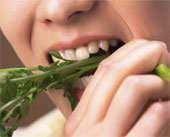
Whole-grain products are rich in vitamin B, calcium, fibre and protein. Eating whole grains on a daily basis will create sustained energy and will make you feel fuller for longer. Well known whole-grains are polenta, whole wheat, barley, bulgar wheat and couscous. Most of these wheats are easy to make, low in fat and delicious!
Lets start with polenta. Polenta is a yellow maize and is rich in carbohydrates.
To cook a soft polenta bring 1l of water with 1/2 tsp salt to the boil. Add 175g of polenta slowly and stir continously until a smooth mixture is formed. Reduce heat and simmer for at least 40 minutes. Stir ocasionally and you will know it is ready when the grains fall from the side of the dish. Stir in some butter and serve hot.
Couscous: Couscous is a form of semolina which is a powder that is produced when milling durum wheat. To cook couscous, simply bring 1 cup of water with a pinch of salt and a dash of olive oil to the boil. Add 1 cup of couscous, stir briefly and remove from heat to steam for a few minutes. Allow to stand for at least 5 minutes, fluff with a fork and add some butter. Serve hot or cold.
Bulgur wheat: Bulgar wheat is packed with vitamin B and E and is very easy to prepare. Simply add 1cup of bulgur wheat to 2cups salted boiling water and allow to stand for about 25 minutes.
Barley: Barley is commonly found in soup mixtures and can also be used to thicken gravies. It is also rich in vitamin B and contains calcium and iron. Bring 3 cups of salted water to the boil. Add 1 cup of barley, stir briefly and reduce heat and simmer until the grains are soft and the water has been absorbed. Serve hot or cold.
Till next time.... Enjoy!

No comments:
Post a Comment